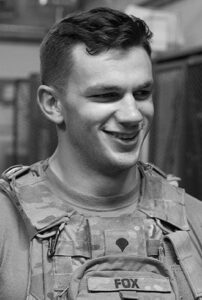
SSG Fox SPGP honors Veteran Parker Gordon Fox, who joined the Army in 2014 and was a sniper instructor at the U.S. Army Infantry School at Fort Benning, Georgia. Known for a life of generosity and kindness to others in need, Fox died by suicide on July 21, 2020, at the age of 25. Source: Veterans Multiservice Center
WASHINGTON, DC — For the past two years, VA has overseen the distribution of grants to community organizations whose work is designed to help prevent veteran suicide. The program is part of a larger public health approach to suicide prevention, the goal of which is to put federal resources behind community organizations addressing the upstream contributors to suicide.
After two rounds of grants, however, several of the recipients report that the program needs significant improvement if it’s to succeed. The administrative workload on both employees and veterans is significant, and there is little to no VA support after the department grants funds to the organizations.
The Staff Sergeant Parker Gordon Fox Suicide Prevention Grant Program was implemented in 2020 as part of sweeping VA mental healthcare legislation. The three-year grant program authorizes $174 million broken into individual awards as high as $750,000. In 2022, VA awarded grants to 80 organizations. In 2023, grants were renewed to 77 of the original recipients, and three new ones added.
The program honors veteran Parker Gordon Fox, who joined the Army in 2014 and was a sniper instructor at the U.S. Army Infantry School at Fort Benning, GA. Known for a life of generosity and kindness to others in need, Fox died by suicide on July 21, 2020, at the age of 25, according to the program’s website.
None of the groups provide direct clinical care but rather targets other factors that contribute to suicide risk, such as housing instability, employment instability, legal trouble and lack of social support and engagement, as well as unstable interpersonal relationships. The groups also connect veterans with VA benefits and healthcare resources when needed.
For nonprofit organizations dependent upon the goodwill of individual donors, a federal grant can be a lifesaver. But the Fox grants also come with excessive red tape and little support, grant recipients told the House VA Health Subcommittee last month.
America’s Warrior Partnership (AWP) connects local veteran-serving organizations with other local and national resources that can meet an individual veteran’s needs. By being experts on what resources are available and how best to navigate the process to access them, they can remove barriers and make it easier for veterans to receive help.
Since March 2023, AWP has worked with 1,057 veterans, with 185 indicating some level of suicide risk, and 180 eligible to take part in the Fox Grant program. After assessing them for needs and conducting a suicide risk assessment, AWP creates a holistic service plan around the veteran’s needs and wants and works to connect them to services.
“We find them national resources,” explained Missy Meyer, AWP’s Director of Community Integration. “In acute cases, that results in a call to the suicide hotline.”
No Expedited Care
There is no expedited care at VA for Fox grant participants, Meyer explained to legislators. There is no dedicated number to make sure those veterans are served immediately. When one veteran called VA saying he was a participant in the Fox Grant program, the VA employee he spoke with had no idea what he was talking about, she said.
“This is one of the major shortcomings of the Fox program,” she said. “It’s not a program; it’s a transaction. It needs to be a relationship, not a VA-sponsored phone call for assessment, with no plan or infrastructure on the back end connected to services.”
While there is little in the way of extra assistance from VA, there are additional responsibilities on the grantee’s end. After a veteran completes the intake process at AWP, there are nine questionnaires that must be completed in order for the veteran to complete enrollment in the Fox Grant program. The questions collect data on suicide risk, socioeconomic status, personal health and other indicators of well-being.
While the Columbia-Suicide Severity Rating Scale has been “a life-saving measure” since AWP integrated it into the intake process, resulting in several post-intake calls to the suicide hotline, the other questionnaires can be exhausting for veterans, Meyer said. Many of the questions touch on deeply personal topics in areas of a veteran’s life where they might be struggling, and they are being asked to answer them without a trained mental healthcare provider present.
Grantees are required to re-administer the questionnaires a second time, once veterans are connected with services, to see whether any of the scores have changed. Only six of the 180 participants who have completed the program have successfully completed both sets of assessments.
This isn’t surprising, Meyer said, since many of the questions are repetitive, and there is no direct benefit to the veteran. Rather, the questionnaires are designed to provide data for VA—data that Meyer does not believe provides any new insights.
“We already know that depression, isolation and financial hardships are risk factors for suicide. How does continually measuring known stressors further prevention efforts?” she asked.
According to VA, the Fox Grant program had 100 participants across all 80 grantee organizations in 2022 and 3,500 in 2023. Since much of that time was spent establishing services, the department expects to see the number of veterans served leap again in 2024.
As for measures of success, officials told the subcommittee that they will consider a grant participant a success if they see a reduction in suicide risk, an improvement in perception of well-being and connecting at-risk veterans to VA services.
Data on how well grant participants are meeting those metrics is expected to be available in March.
